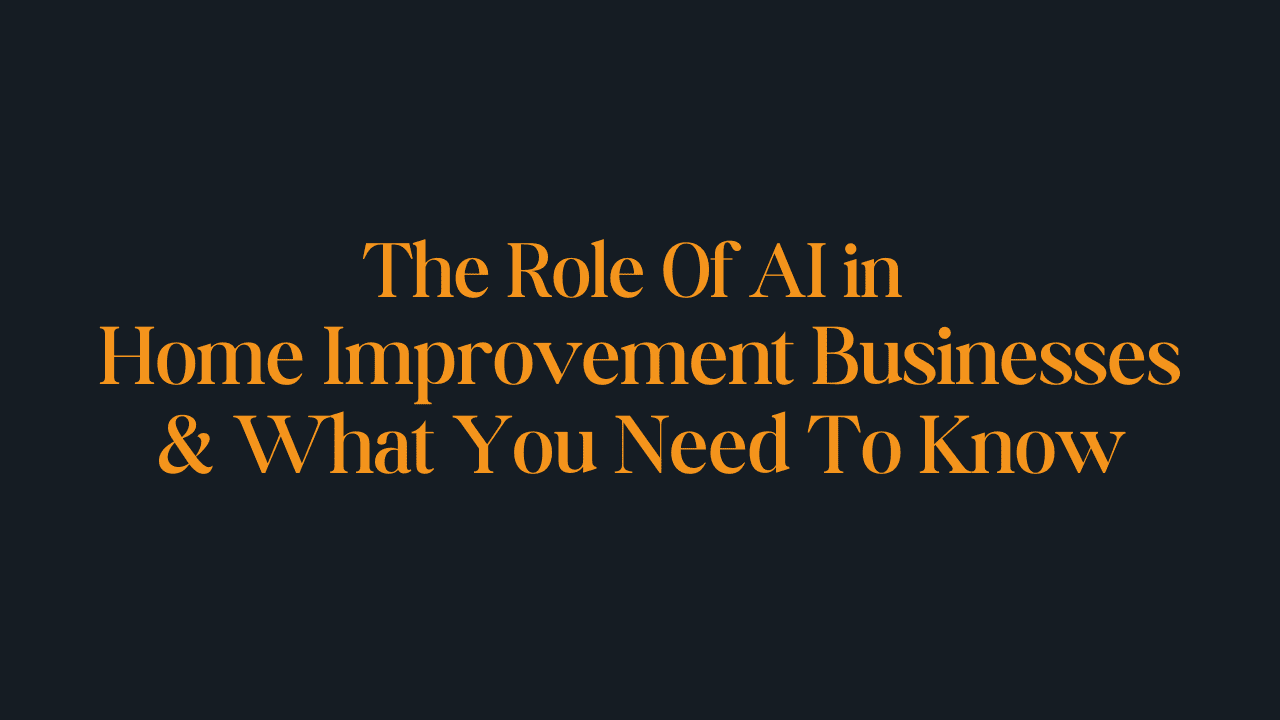
The tsunami wave of digitization has revolutionized numerous sectors and industries, transforming traditional practices and business models. One area that has experienced significant upheaval is marketing and sales, primarily due to the integration of Artificial Intelligence (AI). The dynamics of marketing and sales have shifted dramatically with AI applications, reflecting a critical shift from a human-centered approach to a data-centric marketing strategy.
The plots of sci-fi movies are no longer a far-fetched reality as AI becomes an integral part of our everyday lives. Specifically in the Home Improvement Businesses, AI has ushered in a new era marked by efficiency, precision, and personalization. It transcends the conventional boundaries of customer interaction and engagement, offering innovative solutions and strategies that have become indispensable in the contemporary business landscape.
This piece explores the Role of AI in Home Improvement Businesses and provides essential insights into what everyone needs to know about it. Be prepared to be ushered into the new world of sales and marketing.
Understanding AI in Marketing and Sales
Artificial intelligence (AI) is transforming the dynamics of the marketing and sales landscape across industries. This powerful technology leverages massive data from a variety of sources to draw precise insights, aid decision-making, and design result-oriented strategies. AI in marketing and sales involves data analysis, natural language processing, machine learning, predictive modeling, automation, and more to significantly enhance productivity, customer experience, and business growth.
In marketing and sales, an application of AI includes visibly enriching customer analytics and segmentation, personalizing marketing strategies, generating and nurturing leads, forecasting sales performance, and optimizing efforts.
AI-powered virtual assistant and chatbots now provide real-time customer service while AI in content creation and management offers quality content that's SEO friendly and increases engagement. Nonetheless, challenges and ethical considerations surrounding AI adoption in marketing and sales cannot be overlooked for a secure, reliable system and future growth, which we will explore further in the article.
Customer Analytics and Segmentation
Today, businesses are leveraging the power of artificial intelligence (AI) to gain in-depth insights into their customer base. By collecting and analyzing data from various interactions that customers have with the brand, AI enables companies to understand customer behavior, preferences, and purchasing habits. This data-driven approach helps businesses identify patterns and trends, which they can then use to segment their customers into different groups based on common characteristics.
The application of AI in customer segmentation involves the use of machine learning algorithms. These algorithms can process large volumes of data and detect even the subtlest patterns and correlations. This high level of precision enables businesses to fine-tune their customer segments, resulting in more personalized marketing and sales strategies.
By predicting customer behavior and creating highly tailored marketing campaigns, businesses can enhance customer engagement and drive higher conversion rates. Additionally, the insights gained from AI-driven customer analytics can provide businesses with a competitive edge and enable them to adapt quickly to market changes.
Personalized Marketing Strategies
Understanding customer preferences is central to delivering campaigns that resonate and bring value. With Artificial Intelligence, companies have an indispensable tool at their disposal to revolutionize the marketing game. Leveraging data-driven insights, AI predicts consumer behavior, purchasing patterns, and preferences, enabling businesses to craft highly tailored marketing strategies. These strategies can be as specific as individual preferences, leading to a significant increase in customer satisfaction and engagement.
In an era where retaining customer attention has become increasingly challenging, AI steps in with the valuable service of delivering personalization at scale. With AI's help, marketers can reach out to individuals with tailor-made content relating to the product and services they are interested in. Be it emails, notifications, social media advertising, or in-app messages; every interaction can be customized to the individual's unique taste.
This high level of personalization only enhances the consumer experience, fostering brand loyalty and propelling businesses towards their desired growth trajectory. Talk about AI being the actual 'game-changer'.
Lead Generation and Nurturing
Optimizing the process of attracting potential customers and guiding them down the sales funnel has always been a central concern for businesses. However, traditional methods of drumming up interest and turning leads into customers have always been somewhat hit-or-miss. Today, technology is revolutionizing this process, with Artificial Intelligence (AI) emerging as a vital tool for businesses to streamline their lead generation and nurturing efforts.
AI can provide invaluable assistance by analyzing data sets about customer behavior to identify promising leads and predict the approaches most likely to result in a conversion. This data-driven approach eliminates the guesswork from lead generation and nurturing, allowing businesses to save time and resources.
AI doesn't just identify potential leads; it also helps in nurturing them. For instance, it can make use of historical data to identify optimal times for outreach, inform email campaigns, and personalize interactions to improve overall engagement. Moreover, by leveraging AI, businesses can also establish a more fluid, responsive relationship with prospective customers, making the journey from lead to customer a smoother and more efficient process.
Sales Forecasting and Performance Optimization
Predicting future sales with accuracy can prove to be a game-changing strategy for businesses looking to achieve their revenue targets. However, making these forecasts can be full of complexities. This is where Artificial Intelligence (AI) comes in. By leveraging AI, businesses can elevate their forecasting from an art to a scientific exercise, taking into consideration a myriad of market conditions, customer behaviors, and buying patterns.
This technological intervention not only reduces the pressure on sales teams to make sales predictions but also increases the accuracy of these forecasts, ensuring businesses are better equipped to fulfill their financial goals.
In addition to this, AI also plays a vital role in performance optimization. When it comes to revenue generation, fore fronting the concept of 'knowing your customer' is essential. AI can help businesses delve deep into the data to understand real-time customer interactions better. This information can then be used to optimize marketing and sales efforts, refining tactics continuously to improve customer satisfaction and increase the return on investment.
With AI, businesses are not only predicting the future, but they are learning from it, making adjustments, and constantly improving their performance to keep the revenue ticking and the customer commitment strong.
Virtual Assistants and Chatbots
Harnessing the power of artificial intelligence, chatbots have indeed reshaped the context of customer service in various industries, including home improvement businesses. They have cemented themselves as crucial tools that are ever-ready to address customer inquiries 24/7, ensuring that no query is left unanswered. Given their rapid response capabilities, chatbots play a significant role in upholding and enhancing customer satisfaction levels, which can directly impact a business's reputation and success in the competitive market.
On the other hand, AI-powered virtual assistants are seen as game-changers in the realm of personalizing customer journeys. They are adept at reading and understanding a client's requirements and preferences, which in turn aids in tailoring a unique and satisfactory shopping experience. In the home improvement sector, their potential can be unleashed by implementing virtual assistants which can suggest tailored suggestions like designs, products, etc, according to a customer's past purchases, behavior, and preference.
The human-like interaction they offer, coupled with their ability to learn and adapt over time, makes these virtual assistants an indispensable asset to home improvement businesses in providing a seamless customer experience.
AI in Content Creation and Management
One of the most remarkable transformations in the digital space today is the use of Artificial Intelligence (AI) in improving content creation and management practices. AI is revolutionizing the way businesses strategize and implement their content marketing campaigns.
AI tools can write blog posts, social media content, and even news articles with the same efficacy, and sometimes more accurately and faster than human writers. This not only saves time but also optimizes the content creation process by eliminating human errors, providing insights for better content ideas, and assisting in content personalization based on user preferences.
In addition to content creation, AI is also enhancing content management by automating content categorization, improving searchability, and even predicting content performance. AI-powered tools can analyze an enormous amount of data and draw conclusions about what type of content is most likely to succeed.
This allows businesses to make data-backed decisions about what content to prioritize, generate SEO-friendly tags, and organize their content libraries more efficiently. Notably, AI helps in streamlining the content management process, reducing the manual work involved, and making the entire process more intuitive and productive.
Therefore, understanding how AI can be applied in content creation and management is crucial for businesses aiming for cost-effectiveness and efficiency in their operations. As artificial intelligence continues to advance, there is an increasing need for businesses to adapt and learn about these technologies to stay ahead in the rapidly evolving digital landscape.
Challenges and Ethical Considerations
The infusion of AI in marketing and sales is not without its share of challenges. Adaptation to rapid technological advancements can be a daunting task for businesses, especially smaller ones. These businesses often grapple with the lack of technical expertise, insufficient budgets, and hesitation from employees towards accepting AI-integrated workflows. The sheer volume and complexity of data posed by AI implementation add another layer of challenge, demanding agile data-processing strategies and solutions.
Moreover, leveraging AI in marketing and sales also raises ethical considerations. Concerns about potential misuse of customer data, privacy breaches, and transparency in AI operations are all valid and necessitate strong ethical frameworks. For instance, AI-powered personalized marketing strategies rely heavily on invading customers' personal spaces, using their personal browsing data, purchase histories, etc.
Irrespective of its immense benefits, this raises a moral question: How deep can AI dig into personal preferences without crossing the privacy line? Therefore, businesses must remain cognizant of these ethical boundaries while deploying AI, always ensuring the customer's privacy is respected.
Future Directions and Trends
As the role of AI continues to evolve and expand, there's little doubt its impact on marketing and sales is bound to be revolutionary. As advancements in machine learning and data analytics surge forward, the future encompasses a myriad of new possibilities, from profound customer insight generation to the creation of personalized consumer experiences.
In the realm of home improvement businesses particularly, anticipate a surge in AI-powered solutions. For instance, augmented reality (AR) tools could offer customers the ability to preview products in their own homes, while AI-driven applications can recommend home improvement products based on consumers' previous shopping habits and preferences.
Expect AI to be increasingly embedded in, possibly even steering, the strategic direction of marketing and sales operations, changing not only how we understand sales and marketing, but redefining the interaction between consumer and business through a layer of personalized automated assistance.
If you would like to Harness The Power Of Cutting-Edge AI Automations to Maximize Lead Generation & Scale Your Home Improvement Business While Decreasing Costs please visit https://dominoleads.com
